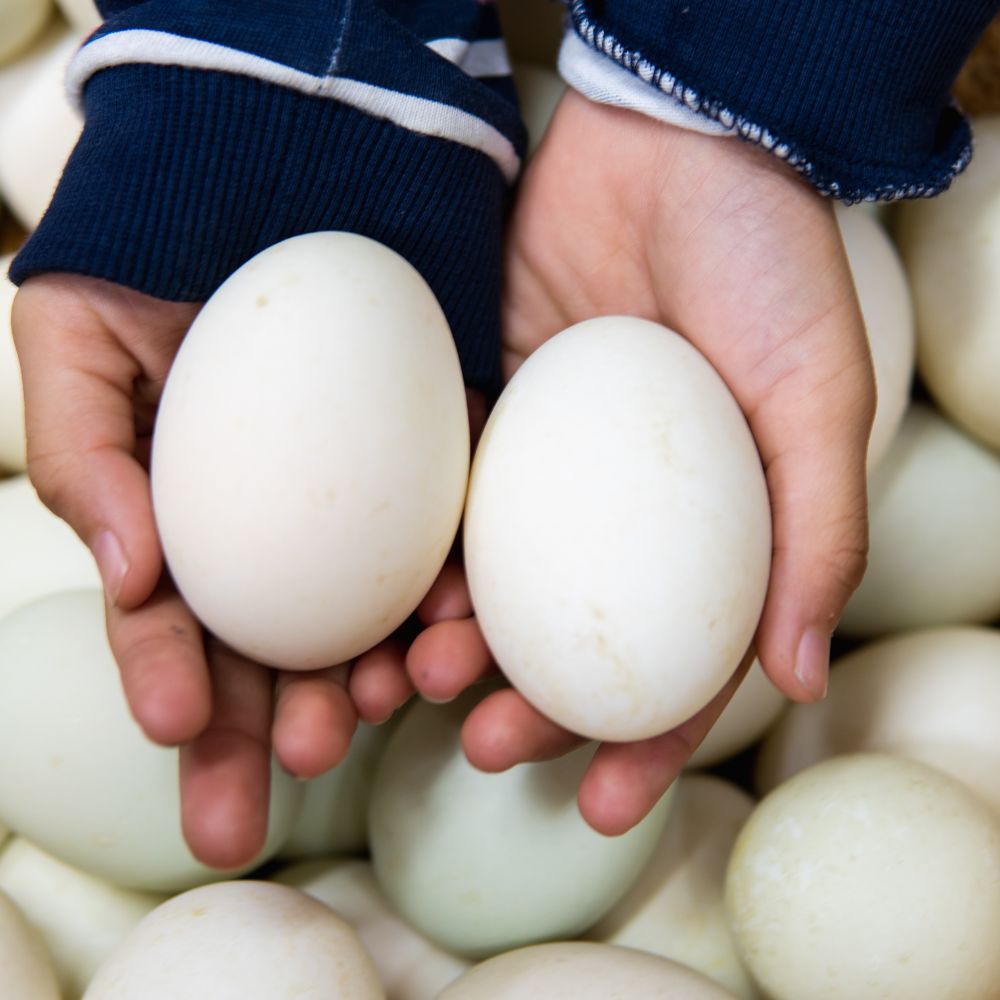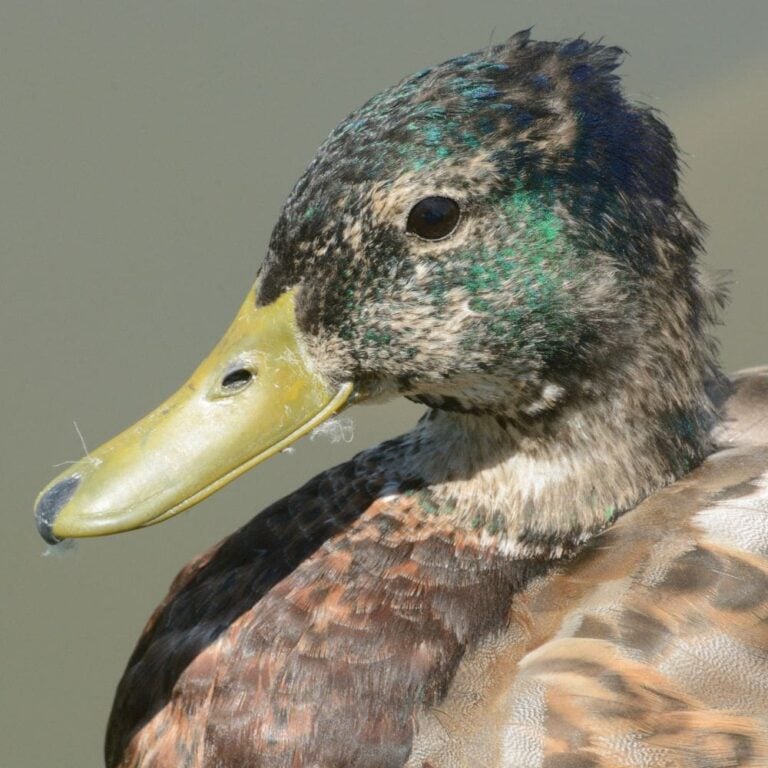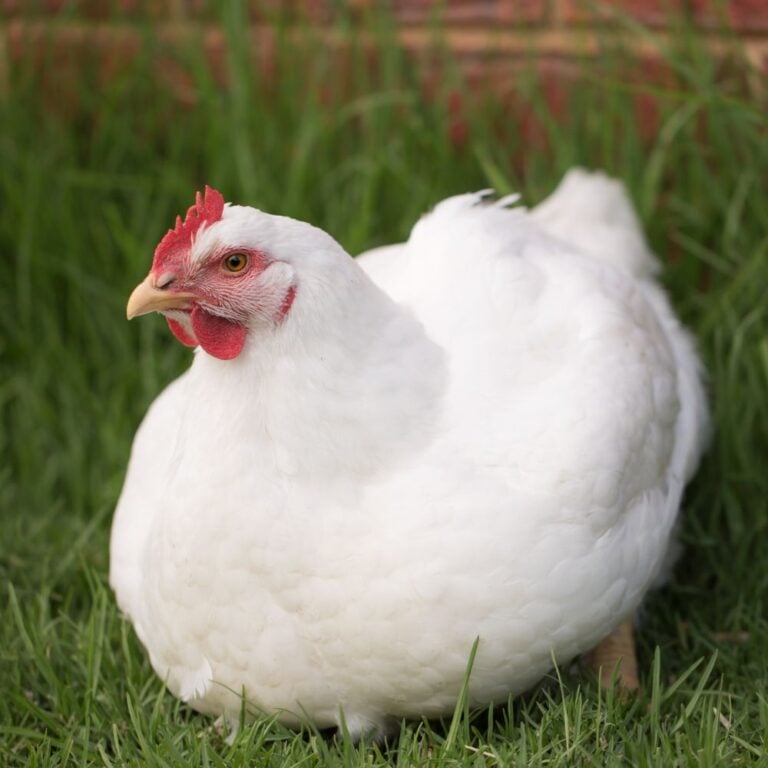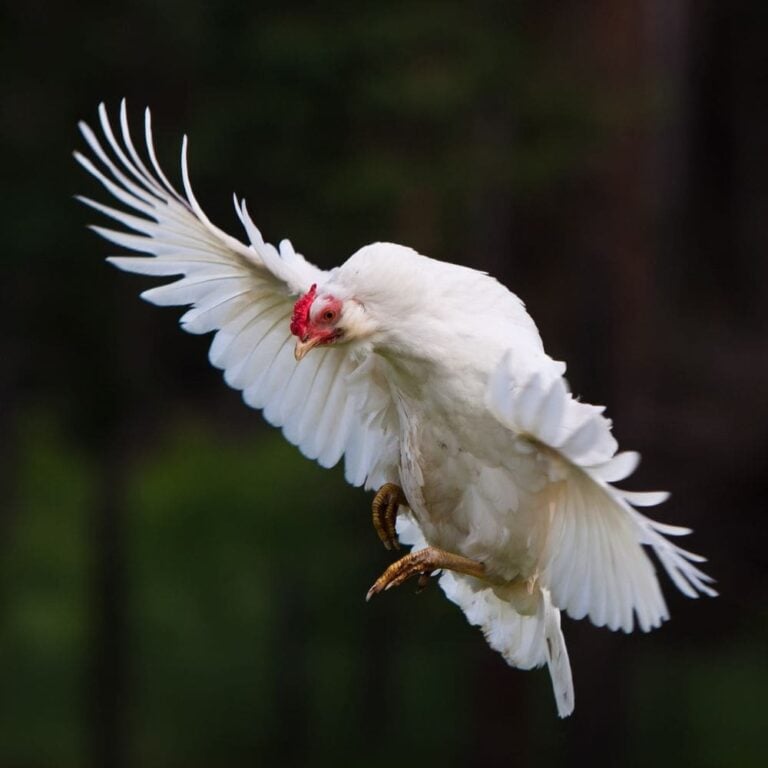Blame it on the huge amount of nutrients or their deliciousness: It’s undeniable that duck eggs are becoming more and more popular for health nuts.
While most people think of chickens when they eat eggs, duck eggs are gradually making their way to kitchen tables everywhere.
And why not? They’re low in calories, great for skin and hair, and, according to science, might be edible even if you have a chicken egg allergy.
In this article, we’ll cover the advantages and disadvantages of duck eggs, along with their health benefits, how to cook with them, where to buy them, and how to make sure they’re fresh!

Table of Contents (Quickly Jump To Information)
Duck Egg Nutrition
Duck eggs are full of nutrients, and some researchers claim they’re perhaps even healthier than chicken eggs – especially for those with egg allergies.
Compared side-by-side with chicken eggs nutrition facts labels, duck eggs provide important nutrients you might not get from just eating chicken eggs.


Advantages of Duck Eggs
- Higher in omega-3 fatty acids
- More protein, riboflavin, folates, iron, phosphorus, Vitamin B, & selenium
- Larger yolks, which means more flavor
- Creamier baked goods
- Better quality of life for poultry, if purchased locally
- Possibly edible if you have egg allergies (check with your doctor first)
Disadvantages of Duck Eggs
- Harder to source
- More expensive ($6-$12 per dozen)
- Possible fishy smell if the ducks aren’t fed a high-quality diet
Are Duck Eggs Healthy For You?
Yes! Duck egg nutrition data indicates this food is a good source of:
- Omega-3 fatty acids
- Protein
- Riboflavin
- Folate
- Iron
- Phosphorus
- Vitamin B12
- Selenium
Duck eggs are full of omega-3 fatty acids, and they’re 67% fat. But don’t let that fool you – that’s “good fat” that’ll help you stay healthy and possibly lose weight if you follow the keto diet.
They’re higher in protein than chicken eggs, thanks to the albumen, which has more proteins in it than chicken eggs. The yolks are bigger, which means they contain more essential vitamins and minerals.
They also might stay fresher for longer due to a thicker shell. Part of the reason their shells are so thick is that the chicken egg industry doesn’t provide sufficient calcium to hens. Since duck eggs aren’t produced on such a commercial scale, they tend to have better diets.
Duck eggs purchased from a local source also might still have the bloom, which is a natural coating on the shell that keeps it fresher for longer periods. However, if you want to wash eggs you bought from a local farmer, you can read this article for advice.
If you’re not sure whether the eggs you purchase are fresh or not, you can try the fresh egg float test.
Are Duck Eggs Safe To Eat?
Yes! Duck eggs are safe and very delicious. Just like chicken eggs, there’s a small possibility of salmonella. To avoid this, purchase your duck eggs from a local source that provides a high-quality diet for their ducks. High-quality diets can reduce instances of salmonella and e-coli infecting the eggs since the duck’s digestive system is healthier. Also, be sure to fully cook the eggs so all bacteria are killed off.
How Long Do Duck Eggs Stay Fresh?
Up to 6 weeks if refrigerated. It’s always best to purchase your eggs from a local supplier so they’re as fresh as possible. Eggs purchased at a supermarket can be nearly 60 days old. You can learn more about how to tell if an egg is good or bad here.
How Many Calories Are In A Duck Egg?
According to the Egg Nutrition Center, duck eggs have about 70 calories each. Whether you boil them, poach them, or scramble them, the calorie count remains the same.
What Do You Do With Duck Eggs?
Duck eggs are delicious when fried, poached, steamed, or boiled. You can cook them exactly like chicken eggs, so there are many recipes out there you can use. They’re great to bake with and yield a creamier texture to cakes. In recipes, you can swap out chicken eggs for duck eggs – just use 1 duck egg for every 1 chicken egg (for example, if the recipe calls for 1 chicken egg, just use 1 duck egg).
If you raise ducks, you can feed the eggshells back to your flock, or even scramble eggs for them.
Can You Eat Duck Eggs Raw?
Nutritionists and doctors recommend not eating raw duck eggs to avoid possible salmonella infection. As a precaution only use duck eggs in recipes that can be thoroughly cooked. Note that duck eggs and chicken eggs have the same chances of carrying salmonella.
Can Someone With An Egg Allergy Eat Duck Eggs?
Possibly. According to the American College of Allergy, Asthma, & Immunology, nearly 2% of the population is affected by an egg allergy. However, duck eggs are different than chicken eggs (since they come from 2 different species) and some people with chicken egg allergies CAN eat duck eggs.
A doctor can help you determine whether you can eat duck eggs if you’re allergic to eggs in general. According to the American Academy of Allergy, Asthma, & Immunology, your doctor might provide tests to see if you’re also allergic to duck eggs.
Are Duck Eggs High In Histamine?
Like chicken eggs, duck eggs are considered to be low in histamines. Eggs in general are good to eat if you have a histamine intolerance. According to one study performed by researchers, the way you cook your duck eggs has no effect on the histamines you consume.
You can also eat duck eggs with certain fruits and vegetables to consume minerals that will help your body release histamines.
Can You Eat Mallard Duck Eggs?
Yes, you can eat mallard duck eggs. Some people even use these eggs for baking, and they say it makes the cakes fluffier. To cook with mallard eggs, simply substitute duck eggs for chicken eggs in the same quantities called for in the recipe. For example, if the recipe calls for 1 chicken egg, use 1 duck egg.
Be sure to only use eggs purchased from a local source – do not disturb wild duck nests for their eggs.
Is Duck Egg Good For Hair?
Duck eggs are great for healthy hair! They’re they are high in protein and contain biotin, which is essential for scalp health and hair growth. A diet high in egg proteins can also lend your hair a healthy shine, and since duck eggs are also high in lecithin, they might help moisturize your locks (lecithin is a fat used to moisturize the hair, and is even used in commercial hair products.)
Additionally, a key constituent of duck egg yolks is sulfur, which is important for healthy hair follicles. You can eat duck eggs or even mix them with oil and wash your hair for healthy, strong locks.
Why Do Duck Eggs Smell Fishy?
If your duck eggs smell fishy, it’s possibly caused by high levels of choline in the egg. According to this study, choline can cause high levels of trimethylamine (TMA) that results in a fishy odor in eggs. However, this is less likely to happen if ducks eat a good high quality feed.
If you’re purchasing eggs and they smell, ask your supplier about their flocks’ diet. If you purchase them at the supermarket, try a different brand. Another possibility is the eggs are rotten or weren’t stored correctly. If your duck eggs smell fishy or bad, throw them out.
Duck Eggs Vs. Chicken Eggs
What’s The Difference Between A Duck Egg And A Chicken Egg?
In most cases the nutritional value of the chicken and duck eggs don’t vary that much, however, duck eggs have higher fat content, higher protein, are full of omega 3 fatty acids, and have more cholesterol (the good kind of cholesterol) than chicken eggs.
You might notice that duck eggs have very large yolks compared to chicken eggs – in fact, duck egg yolks comprise 42% of the total weight of the egg! That’s a lot of nutrients in one small package!
Some people report that duck eggs might have an earthy or denser taste to them, although most people say they taste the same.
Why Are Duck Eggs More Popular?
Duck eggs are better used for pastries and for diet recipes as duck eggs are considered healthier than chicken eggs.
How Do Duck Eggs Taste Compared To Chicken Eggs?
Some people report that because of their higher fat content and bigger yolks, duck eggs have a slightly richer flavor than chicken eggs. However, duck eggs and chicken eggs usually taste the same.
You might notice that duck eggs enhance the flavor of baked goods because the larger yolks make baked good creamier.
Which Is Healthier Chicken Or Duck Eggs?
Neither is healthier than the other. Their nutritional value will depend on your dietary goals. Duck eggs are higher in fat (because the yolks are bigger) than chicken eggs, however, they’re higher in omega-3 fats, which are a good fat. They’re also higher in protein, and are an excellent source of folic acid, Vitamin B, Vitamin A, Vitamin D, iron, and other essential nutrients. If you’re allergic to chicken eggs, you might be able to eat duck eggs.
Both chicken and duck eggs are low in histamines, so they’re both great to eat if you have histamine issues.
Do Duck Eggs Have Cholesterol?
Yes, duck eggs have about 620 mg of cholesterol, which is significantly higher than chicken eggs. However, there’s good cholesterol and bad cholesterol.
If you’re worried or trying to avoid cholesterol, then check with your doctor about whether adding duck eggs to your diet is advised.
Where To Buy Duck Eggs
You can purchase duck eggs to eat from:
- A supermarket like Whole Foods
- A local farmer or duck keeper
- Farmer’s markets
- Etsy (shipped duck eggs)
Duck eggs usually cost about $6 per dozen, although prices do vary. While you can purchase them on Etsy, it’s simpler to find a Whole Foods or a farmer’s market in your area.
Why Are Duck Eggs So Expensive?
Duck eggs are more expensive than chicken eggs partly because they’re larger, and partly because there’s no real industrial production of the eggs (which keeps costs low, but sacrifices quality).
If you purchase your eggs locally, from a farmer or someone who has a flock, you can be sure the ducks have a happy life and have been fed a high-quality diet.
Cooking with Duck Eggs
How Many Chicken Eggs Equal A Duck Egg?
You can substitute 1 chicken egg for 1 duck egg in recipes. Baking with duck eggs is easy, and you might find the duck eggs yield a creamier and fluffier baked good because of the larger yolk.
Duck Eggs Recipes
You can find a full list of 50 different egg recipes here. Simply substitute duck eggs in any of these recipes. You can also find a list of ideas to use up excess eggs and eggshells here.
Scrambled Duck Eggs Recipe
Whisk 2 duck eggs with 1 tablespoon of cream. Add a pinch of basil. Cook on medium heat until thoroughly cooked.
Hard Boiled Duck Eggs Recipe
Add 2 duck eggs to water at a rolling boil. Remove after 4 minutes. Immediately sink into ice cold water and leave until cool. Remove shells and enjoy.
If you want to try something a bit different, soak your hard boiled eggs in tea to make delicious tea eggs.
Soft Boiled Duck Eggs Recipe
Add 2 duck eggs to water at a rolling boil. Remove after 2 minutes. Immediately sink into ice cold water and leave until cool—place in a bowl or egg cup. Remove the top portion of the shell to eat with a spoon.
Poached Duck Egg Recipe
Bring a pot of water to a rolling boil. Crack 1 duck egg into a separate bowl. Quickly stir the boiling water so it creates a cyclone in the center. Add the duck egg immediately. Cook for 3 minutes, then remove the duck egg, and put it on a plate. Repeat for the remaining duck eggs.
Fried Duck Eggs Recipe
Heat a cast iron pan until hot. Add 1 tablespoon of butter so the eggs don’t stick. Crack 1-2 duck eggs into the pan. Fry until the whites are opaque and no longer liquid. Transfer to a plate to enjoy.
Baking With Duck Eggs
When baking with duck eggs vs. chicken eggs, you can simply substitute 1 duck egg for 1 chicken egg. An easy recipe to start out with is English Custard.
Raising Ducks for Eggs
Which Ducks Lay The Best Eggs?
Khaki Campbells or Runner ducks lay the best eggs – about 300 per year. Pekin ducks also lay consistently, although their eggs tend to be larger than Khaki Campbells or Runner duck eggs, which can cause them to taste rubbery if overcooked.
To get the best eggs nutritionally and avoid a fishy smell, it’s best to purchase eggs from a local supplier who gives their flock a high protein feed. You can learn what ducks eat here. You can also see a full list of abnormal egg types to avoid here.
Do Ducks Lay Eggs Every Day?
Ducks will lay about 3-5 eggs a week depending on the individual bird. To ensure your ducks lay consistently, offer them a high protein diet of at least 16% protein like this. You can also add herbs to their diet to support a healthy digestive system, which will help them maintain or improve egg production. If your ducks aren’t laying eggs at all, and they’re the right age, then this article can help you figure out what’s going on.
At What Age Do Ducks Lay Eggs?
Ducks tend to start laying eggs at about 6 months. However, if your ducks become 6 months old in the winter or during very hot summers, it might take them longer to start laying because of the weather. (Cold, heat, or fewer daylight hours can affect egg production).
Can Ducks Lay More Than 1 Egg A Day?
No, ducks only lay 1 egg during a 24-hour period.
What Color Are Duck Eggs?
Different duck breeds lay different colored eggs. While most ducks lay white eggs, they can also lay off white, cream tinted, green, blue, or black eggs. Here’s a chart that shows you which breeds lay different colored eggs:
| Breed | Egg Color | Eggs Laid Per Year |
| American Pekin | White | 200 |
| Ancona | Green | 200 |
| Appleyard | White | 250 |
| Black East Indie | Grey, charcoal grey | 200 |
| Call Duck | Green, white, cream | 300 |
| Cayuga | Black, charcoal grey, light grey | 200 |
| Crested Duck | White | 200 |
| Indian Runner Duck | Green, blue | 300 |
| Khaki Campbell | White | 280 |
| Muscovy | Off white, cream, speckled | 200 |
| Magpie | White, bluish green | 280 |
| Mallard | White, greenish white | 200 |
| Orpington | White | 300 |
| Rouen | White | 250 |
| Saxony | White | 200 |
| Swedish | White | 200 |
| Welsh Harlequin | White, blue | 300 |
For better eggs, there’s a lot you can feed your ducks. You can find out what to feed poultry for better tasting eggs here.
If you end up with more than you know what to do with, you can read how to preserve eggs here.
Hatching Ducklings
How Do Duck Eggs Get Fertilized?
After the drake mates with the hen, the sperm goes up the oviduct and fertilizes an egg yolk that was released from the hen’s oviduct. The yolk and albumen then descend down the oviduct, where they are encased in the shell and finally laid by the duck hen.
How Can You Tell If A Duck Egg Is Fertile?
If you don’t intend to incubate the egg, you can crack it open and see if the egg has been fertilized. You should see a “bullseye” in the yolk, which indicates fertilization.
If you want to incubate the egg, and you know your duck hens have been mating with a drake, then incubate the egg (you can learn how to incubate eggs here). After 10 days, candle the egg – if you see a dark spot around the middle of the egg with spider-like veins beginning to form, then it is fertile and you have a duckling embryo growing.
You can learn which incubators we recommend here.
How Do You Know If A Duck Egg Is Alive?
Candle the duck egg. If you see clear and distinct veins, then the egg is developing a duck embryo. Proper incubation is important for it to fully develop.
By day 12, you should start to see signs of movement inside the egg. Alternatively, after Day 12 of the incubation cycle, you can gently place the egg in water and see if it wiggles. The water causes the embryo to react, which produces the wiggle. However, this method might disrupt embryo development, and I don’t recommend it.
How Do You Take Care Of Duck Eggs?
If you spot duck eggs in the wild, it’s best to leave them alone. But if you have an abandoned nest on your property (for example, if you know for certain the hen was killed by a predator or your domestic duck abandons her nest), then you can complete the incubation cycle with an incubator.
The incubator temperature should be 99.5 degrees F, with 50% humidity inside the incubator. Duck eggs take 28 days to develop and hatch. Around day 10, you should start to see veins and other signs of development, if the eggs are fertile.
Once the eggs hatch, you’ll have baby ducks. You can learn how to raise ducklings here.
Where Can You Buy Duck Eggs For Hatching?
Some places to look are:
- Hatcheries
- Local breeders
- Ebay
- Etsy
Note that hatching eggs you purchase and are shipped through the mail isn’t that easy. The post office is rough on the eggs, and even the most careful breeder can’t control what the post office does.
My recommendation is to purchase ducklings from a local breeder or farm store rather than buying hatching eggs. If you do want hatching eggs, you can check big, established hatcheries like Cackle Hatchery.
You can also learn how to properly store hatching eggs here.
Can A Rooster Fertilize A Duck Egg?
No, a rooster is a chicken, which is a different species than ducks. So, a rooster cannot fertilize a duck egg. This scenario should be avoided because roosters can easily harm duck hens by placing too much pressure on the duck’s back.
Summary
Ducks are awesome creatures with eggs that are amazing. You now have all the information you need to decide for yourself. Have some fun and experiment with different recipes. Also, you might try hatching your own duck eggs.
Life is too short to pass up on opportunities like this – so go find some duck eggs and enjoy!
Disclaimer and References
*The information in this article is for educational and entertainment purposes only. The nutrition facts labeling on this site is an estimate. Always consult a qualified professional regarding your diet. The theoretical egg nutritional values included in this article are based on the following references:
- 21 CFR 101.9 Nutrition labeling of food
- Staggs, CG et al. J Food Compost Anal. 2004;17(6):767-776.
- U.S. Department of Agriculture, Agricultural Research Service. FoodData Central, 2019. Database #01123.
- U.S. Department of Health and Human Services. Food and Drug Administration. Guidance for Industry: Nutrition and Supplement Facts Labels Questions and Answers Related to the Compliance Date, Added Sugars, and Declaration of Quantitative Amounts of Vitamins and Minerals. November 2018.
- U.S. Department of Health and Human Services. Food and Drug Administration. Food Labeling: Revision of the Nutrition and Supplement Facts Labels Final Rules. May 27, 2016.
- U.S. Food and Drug Administration. Total Diet Study. April 2014 revised April 2017
Are duck eggs for you? Leave a comment below!
The information in this article about duck eggs was reviewed by a licensed physician.
Maat van Uitert is a backyard chicken and sustainable living expert. She is also the author of Chickens: Naturally Raising A Sustainable Flock, which was a best seller in it’s Amazon category. Maat has been featured on NBC, CBS, AOL Finance, Community Chickens, the Huffington Post, Chickens magazine, Backyard Poultry, and Countryside Magazine. She lives on her farm in Southeast Missouri with her husband, two children, and about a million chickens and ducks. You can follow Maat on Facebook here and Instagram here.






